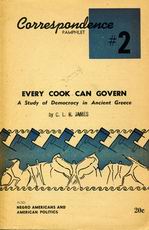
Every Cook Can Govern
A Study of Democracy in Ancient Greece: Its Meaning for Today
James, C.L.R.
http://www.connexions.org/CxArchive/MIA/james-clr/works/1956/06/every-cook.htm
http://www.marxists.org/archive/james-clr/works/1956/06/every-cook.htm
Publisher: Correspondence Pamphlet
Year Published: 1956
Resource Type: Pamphlet
Cx Number: CX6279
Modern parliamentary democracy elects representatives and these representatives constitute the government. Before the democracy came into power, the Greeks had been governed by various forms of government, including government by representatives. The democracy knew representative government and rejected it. It refused to believe that the ordinary citizen was not able to perform practically all the business of government.
Abstract:
-
Excerpt:
The Greek form of government was the city-state. Every Greek city was an independent state. At its best, in the city state of Athens, the public assembly of all the citizens made all important decisions on such questions as peace or war. They listened to the envoys of foreign powers and decided what their attitude should be to what these foreign powers had sent to say. They dealt with all serious questions of taxation, they appointed the generals who should lead them in time of war. They organized the administration of the state, appointed officials and kept check on them. The public assembly of all the citizens was the government.
Perhaps the most striking thing about Greek Democracy was that the administration (and there were immense administrative problems) was organized upon the basis of what is known as sortition, or, more easily, selection by lot. The vast majority of Greek officials were chosen by a method which amounted to putting names into a hat and appointing the ones whose names came out.
Now the average CIO bureaucrat or Labor Member of Parliament in Britain would fall in a fit if it was suggested to him that any worker selected at random could do the work that he is doing, but that was precisely the guiding principle of Greek Democracy. And this form of government is the government under which flourished the greatest civilization the world has ever known.
Modern parliamentary democracy elects representatives and these representatives constitute the government. Before the democracy came into power, the Greeks had been governed by various forms of government, including government by representatives. The democracy knew representative government and rejected it. It refused to believe that the ordinary citizen was not able to perform practically all the business of government. Not only did the public assembly of all the citizens keep all the important decisions in its own hands. For the Greek, the word isonomia, which meant equality, was used interchangeably for democracy. For the Greek, the two meant the same thing. For the Greek, a man who did not take part in politics was an idiotes, an idiot, from which we get our modern word idiot, whose meaning, however, we have limited. Not only did the Greeks choose all officials by lot, they limited their time of service. When a man had served once, as a general rule, he was excluded from serving again because the Greeks believed in rotation, everybody taking his turn to administer the state.
Subject Headings


